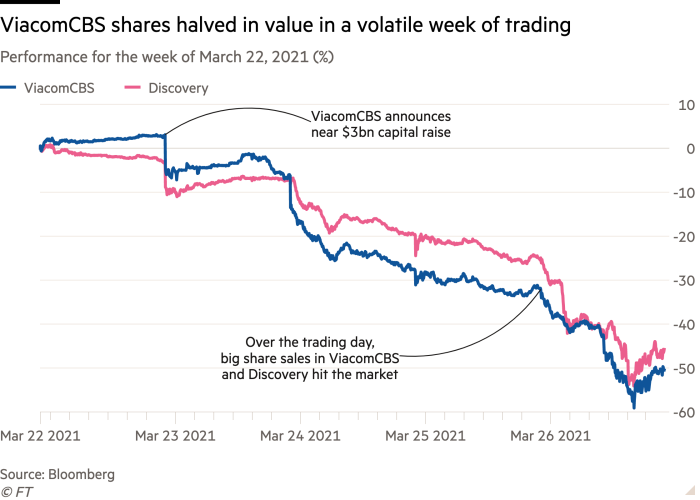Credit Suisse and Nomura warn of losses after Archegos-linked sell-off
Credit Suisse and Nomura have warned of large losses after a fire sale of about $20bn of Chinese and US stocks, as their client Archegos Capital Management was forced into a huge unwinding of assets.
Nomura could face a total wipeout of its profits for the second half of the financial year, while Credit Suisse has warned the sell-off could have a “highly significant and material” impact on its first-quarter results.
Shares in Japan’s largest investment bank fell 16 per cent on Monday in Tokyo — their worst-ever one-day fall — erasing more than $3.2bn from its market capitalisation, as Nomura warned of recent transactions with an unnamed client and the risk of a “significant loss” at its US subsidiary.
The Japanese and Swiss banks provided prime brokerage services to Archegos, which was founded by former hedge fund manager Bill Hwang, according to several people close to the matter. Prime brokers loan cash and securities to hedge funds and process their trades.
Credit Suisse said in a statement on Monday: “A significant US-based hedge fund defaulted on margin calls made last week by Credit Suisse and certain other banks. Following the failure of the fund to meet these margin commitments, Credit Suisse and a number of other banks are in the process of exiting these positions.”
It added: “While at this time it is premature to quantify the exact size of the loss resulting from this exit, it could be highly significant and material to our first-quarter results.”
Two people close to the bank said the expected loss was estimated to be between $3bn and $4bn. Credit Suisse declined to comment.
Credit Suisse reported $2.9bn of net income for all of 2020. Shares in the Swiss lender fell 10 per cent on Monday morning.
A person with knowledge of the bank’s relationship with Archegos said the losses were contained within its New York prime brokerage unit and did not extend to its wealth management business. Credit Suisse has a policy of offering a range of financial services to its wealthy private bank clients.
Nomura said in a statement that it was evaluating the extent of the potential losses, noting that its estimated claim against the client was about $2bn. The bank said that figure was based on market prices at the close of the US trading on Friday and could rise should asset prices continue to fall.
Deutsche Bank was also exposed to the Archegos sell-off but its losses are expected to be a fraction of those suffered by other brokers, according to a person familiar with the bank, who added that Germany’s largest lender had hedged the bulk of its exposure.
Archegos, a private investment firm, was behind billions of dollars worth of share sales that captivated Wall Street on Friday. The fund, which had large exposures to ViacomCBS and several Chinese technology stocks, was hit hard after shares of the US media group began to tumble last Tuesday and Wednesday. The declines prompted a margin call from one of Archegos’s prime brokers, triggering similar demands for cash from other banks.
Hedge funds in Hong Kong and Tokyo said on Monday that traders were braced for further block sell-offs in stocks associated with Archegos and other funds that could also be forced to unwind heavily leveraged positions, such as Teng Yue Partners, when trading opens in the US on Monday. Teng Yue was not immediately available for comment.
Hideyasu Ban, an analyst at Jefferies, said a $2bn loss estimate logged in the March quarter would wipe out most of Nomura’s pre-tax profits for the second half of the financial year ending this week.
Other prime brokers that had provided leverage to Archegos said the problems at Nomura and Credit Suisse related to being slower in offloading share blocks into the market compared with their peers, notably Goldman Sachs and Morgan Stanley.
An executive at a Wall Street bank in Hong Kong said: “It is unclear why Nomura sat on their hands and racked up these large losses.”
Another Tokyo-based banker said the extremely high level of leverage Nomura appeared to have extended to Archegos was “baffling”.

Archegos is a family office that manages the wealth of Hwang, a “Tiger cub” alumnus of Julian Robertson’s legendary Tiger Management hedge fund. It had about $10bn of assets last week, according to prime brokers. New York-based Hwang previously ran the Tiger Asia hedge fund, but he returned cash to investors in 2012 when he admitted to wire fraud relating to Chinese bank stocks.
An executive at a global hedge fund in Hong Kong said: “It is surprising that a China-oriented fund was using Nomura and being granted so much leverage by a Japanese bank. It looks to have been at least four times what a long/short equity fund would normally get.”
Teng Yue, run by fellow Tiger cub Tao Li, has also been linked to the sell-off that hit shares in US media groups and Chinese technology business GSX Techedu last week, according to prime brokers and traders in Hong Kong.
Bankers in Tokyo familiar with the circumstances surrounding the heavy sell-off of Archegos assets described the event as a possible “Lehman moment” that would force multiple lenders to recognise that leverage extended to the fund had created excessive risk.
Nomura and Credit Suisse were among at least five banks that provided prime brokerage services to Archegos alongside Goldman Sachs, Morgan Stanley and UBS, according to people close to the matter.
Some banks banned all trading globally with Hwang after he settled with US regulators over illegal trading charges in 2012 and was banned from trading in Hong Kong in 2014.
Additional reporting by Olaf Storbeck in Frankfurt and Owen Walker in London



